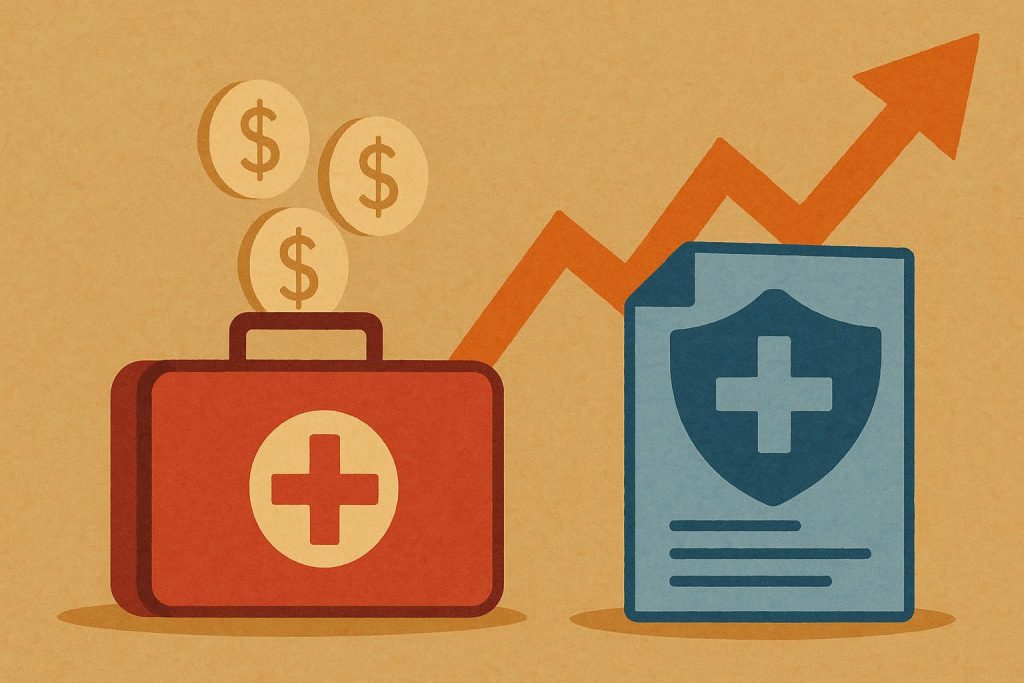Healthcare in India is advancing at a rapid pace. New technologies, better treatments and expanding hospital networks are all positive signs. But they come at a price. The steady increase in healthcare costs, known as medical inflation, is something you can’t ignore, especially when it directly affects how much you pay for your health insurance.
In this blog, we’ll walk you through what medical inflation means, how it impacts your medical insurance premiums and what you can do to deal with the rising costs.
What is Medical Inflation?
Medical inflation refers to the rising cost of medical services, treatments and drugs. It is the rate at which healthcare prices grow each year. Unlike general inflation, which is the increase in prices across all sectors, medical inflation is specific to the healthcare sector.
Key reasons behind medical inflation:
- Rising hospital infrastructure costs – building and maintaining modern hospitals is expensive.
- Increased cost of medical equipment and imported technology.
- Higher salaries for skilled medical professionals.
- Inflation in the prices of medicines and consumables.
Why is Medical Inflation High in India?
Several factors contribute to the rising medical costs in India. These are:
1. Increase in Lifestyle Diseases
- Conditions like diabetes, hypertension and heart ailments are becoming more common.
- These illnesses need ongoing monitoring, medications and sometimes surgical intervention.
2. Advancements in Medical Technology
- New machines and techniques offer better diagnosis and treatment.
- But the cost of acquiring and maintaining such technology is passed on to patients.
3. High Cost of Imported Equipment
- A significant portion of India’s medical devices and equipment is imported.
- Currency fluctuations and import duties drive up treatment costs.
4. Labour and Operational Costs
- Salaries for skilled healthcare professionals are on the rise.
- Hospitals are also investing in better infrastructure and service quality.
5. Rise in Private Healthcare Spending
- Many Indians prefer private hospitals over public ones due to better facilities.
- Private healthcare comes with a steeper price tag.
How Medical Inflation Impacts Health Insurance
As treatment costs rise, insurance providers adjust their pricing models. Here’s how medical inflation directly affects your medical insurance:
1. Higher Premiums
- Insurers review past claims and market healthcare trends.
- If average treatment costs increase, your premium amount will also rise during renewal.
2. Reduced Coverage for the Same Price
- To keep premiums unchanged, some insurers may reduce coverage benefits.
- That means fewer facilities or lower claim limits.
3. Increased Waiting Periods and Co-payments
- Insurers may increase waiting periods for pre-existing conditions.
- Higher co-payments or deductibles are introduced to share rising costs.
Medical Inflation and Its Impact on Family Health Insurance
When it comes to family health insurance, the effect is even more noticeable. Since such plans cover multiple members, the likelihood of a claim is higher. That means insurers calculate premiums based on a broader risk profile.
Here’s how:
- Premiums increase significantly with age, especially if there are senior citizens in the plan.
- Making multiple claims in a single year can result in a higher premium at renewal.
- Even a single hospitalisation in a private facility can result in a sharp hike in next year’s premium.
Strategies to Tackle the Impact of Medical Inflation
Here are a few practical ways to handle rising premiums and get the most out of your medical insurance:
1. Review Your Sum Insured Regularly
- Ensure your policy provides sufficient coverage to match current treatment costs.
- Consider increasing your sum insured every 2-3 years to ensure adequate coverage.
2. Choose Family Floater Plans Wisely
- A family health insurance plan can be cost-effective if all members are relatively healthy.
- However, if one member requires frequent medical care, it could significantly impact premiums.
3. Opt For Super Top-Up Plans
- These plans take effect after a specified deductible is met.
- They help manage high treatment costs without significantly increasing your base premium.
4. Maintain a Healthy Lifestyle
- Avoiding claims for minor issues keeps your no-claim bonus intact.
- Insurers often reward claim-free years with discounts or higher cover at no extra cost.
5. Look for Wellness Benefits
- Some policies offer discounts or lower premiums for meeting health goals.
- Use wearable devices or apps that track fitness and share data with insurers, if allowed.
Conclusion
Medical inflation is a reality that can’t be ignored. As hospital bills and treatment charges go up every year, your health cover needs to keep pace. Whether you rely on individual coverage or family health insurance, you need to review, revise and refresh your plans regularly.

